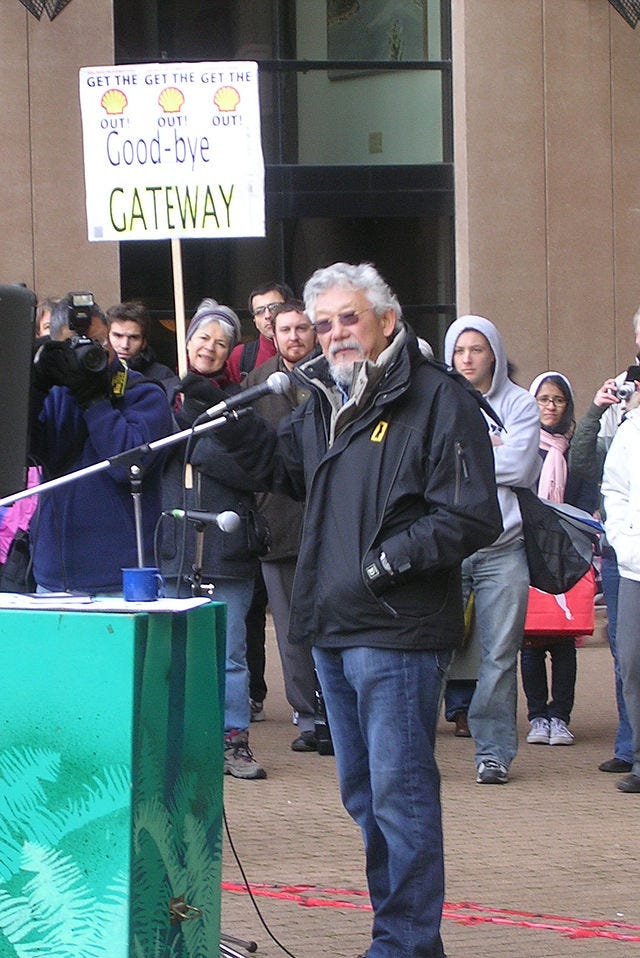Jason Kenney TRIGGERED by David Suzuki's pipeline remarks
The famed environmentalist is under fire from Alberta's government for relatively anodyne remarks warning of environmentalists taking more radical action if governments fail to act on climate
Alberta’s government put forward a motion in the legislature Tuesday to denounce David Suzuki’s remarks at an Extinction Rebellion-led protest on Vancouver Island, where he cautioned that if governments don’t act to stem the climate crisis, environmentalists could start engaging in sabotage against fossil fuel infrastructure.
“This is what we’ve come to. The next stage after this, there are going to be pipelines blown up if our leaders don’t pay attention to what’s going on,” Suzuki said.
The government’s motion, introduced by House Leader Jason Nixon, denounces “any comments made calling for the intentional destruction of energy infrastructure” as well as “incitements of violent eco-terrorism,” Lisa Johnson of the Edmonton Journal reports.
“I think every single Canadian should be appalled by any comments that can be used to incite violence, that in any way refer to the blowing up of a pipeline, or any type of infrastructure,” Nixon added.
Of course, Suzuki said nothing of that sort, but as the government’s inquiry into anti-Albertan activities demonstrated, when have the facts ever gotten in the way of a public vilification campaign?
When asked to clarify his remarks by the National Post’s Tyler Dawson, Suzuki said of course he doesn’t advocate ecoterrorism, but correctly observed that the vast majority of violence in this debate is coming from law enforcement brutalizing those who blockade fossil fuel projects, as we’re currently witnessing in Wet’suwet’en.
Premier Jason Kenney accused Suzuki of dog-whistling toward those who advocate violence, arguing that if Suzuki were any other public figure, he would have been “cancelled.”
“I think it creates a context that some people could use to rationalize violence,” said Kenney, who once told a group of oil executives that Russia’s imprisonment of environmentalists was “instructive.”
Alberta’s NDP opposition agreed with Kenney and Nixon about Suzuki’s comments, as they do on just about every matter related to oil and gas.
“These statements were risky, harmful and dangerous,” said NDP justice critic Irfan Sabir, who called for more civility while the planet burns.
As a sop to the progressives whose support the party is constantly taking for granted, Sabir added that the NDP is “concerned about the heavy-handed and violent nature of the enforcement action taken in Wet’suwet’en territory.”
In other news …
Calgary city council votes to fork over $6 million more to the cops
The 11-4 vote was notably opposed by Mayor Jyoti Gondek and the two city councillors who sit on the Calgary Police Commission — Courtney Walcott and Gian-Carlo Carra.
The $6.1-million budget increase will allow the cops to hire 38 new staff, including 13 new officers, on top of the 60 new positions that were already funded for this year.
Walcott said the police budget has increased from $277 million to $411 million over the past decade, but the city has not provided “any form of scrutiny” for CPS spending.
This comes a year after Calgary police agreed to forego $8 million of its budget to invest in alternative response methods for people in crisis.
A one-year-old has died of COVID in Alberta
Alberta chief medical officer of health Dr. Deena Hinshaw noted that the “child had complex pre-existing medical conditions that played a significant role” in their death.
Of the 3,227 Albertans who have died from COVID, 33 were in their 30s, 14 in their 20s and one was 18.
This is Alberta’s first paediatric COVID death, which comes the same day the province announced its vaccine rollout for children ages five to 11.
Association president Dallas Sopko estimates that the province is 47 prosecutors short, but says it’s hard to keep track because of how quickly prosecutors are leaving.
A spokesperson for Alberta Justice told Global News that as of Sept. 30, there were 39 vacancies out of 377 trial Crown prosecutor positions, but said the “number of vacancies remains fluid,” echoing Sopko.
“The impact on the complainants, witnesses and the public in general is that Crown prosecutors are having to make decisions about whether to run files, not based on the strength of the evidence, but rather based on which files on their desk are more important,” said Criminal Trial Lawyers’ Association president Danielle Boisvert.
Edited by Scott Schmidt



